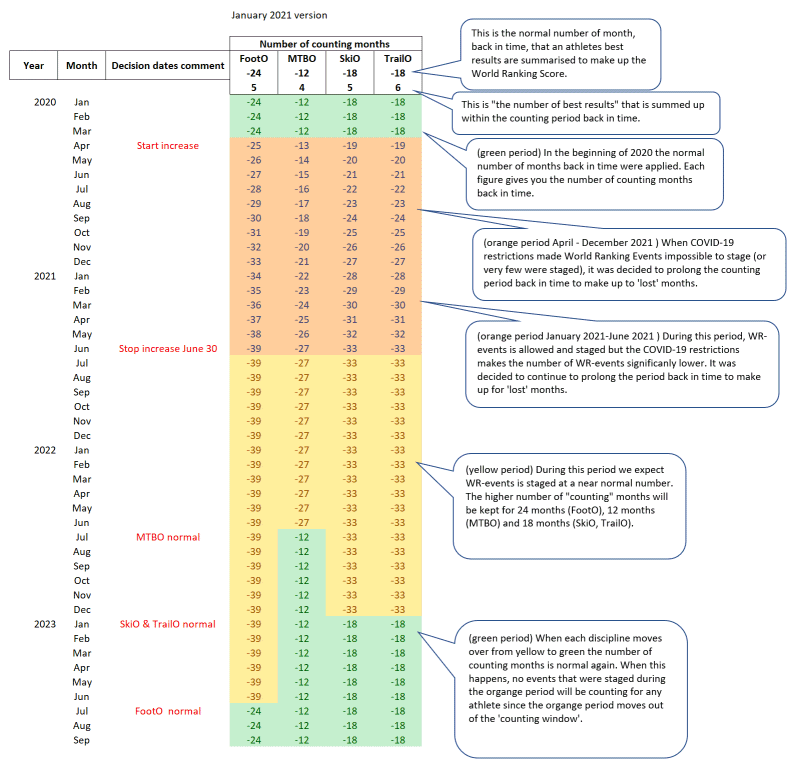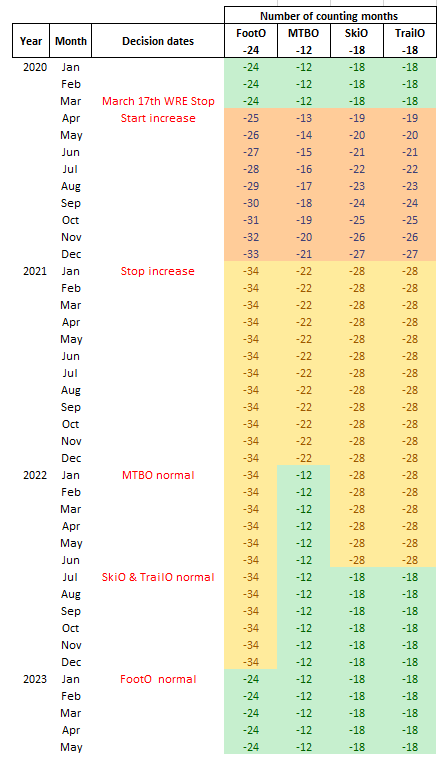2025
February- March: The World Ranking system were moved from one server to another. We also changed the domain to .sport.
Please feedback to results@orienteering.sport if you find issues.
April 2023
Changes:
- MTBO period changed from 12 to 18 months
- MTBO - The six best scores subject to the above provisions are totalled to give a person’s ranking list score
January 2023
Changes:
- Points for High-Level events enhanced by fixed percentages.
January 2021
In June 2020, the IOF Council decided to prolong the period(s) back in time, starting from 2020-04-01 during which the athletes’ best results are counted to make up their world ranking points total. Council also decided (in June) that they would review the decision in Jan 2021 if there are still effects of COVID-19 that affect athletes’ ability to gain world ranking points. Council meeting 204 decided to further prolong the counting periods for FootO, SkiO, TrailO and MTBO until 30 June 2021. This means that the ‘older’ events (that normally do not count) will still contribute to an athlete’s world ranking points score and ’make up’ for ‘lost’ time during COVID-19 affected periods during 2020 and 2021.

January 2021
At the beginning of January, the IOF was informed of an issue with the World Rankings algorithm regarding one specific event. The investigation which followed this discovered that 4 events had points calculated as if the winners score were capped at 1400 when there should have been a maximum score of 1375 instead. This was caused by an input error linked to the change in WRS Rules in Jan 2019 when the maximum score was reduced from 1400 to 1375. The affected events spanned from 2019-01-13 to 2020-06-27 and all have now had points recalculated with the right algorithm. The affected events (IOF Eventor IDs and WRS IDs) were: "6160", "6199", "6397" and "6398".
23 other events also had the wrong maximum of 1400, but they were not affected because the winners’ points did not need to be scaled. These events have now been updated with the right algorithm. These events were: (IOF Eventor ID:s: and WRS ID:s): "6250", "6129", "6130", "6350", "6280", "6200", "6450", "6451", "6452", "6285" ("1006371", "1006372", "1006373"), "6327", "6328", "6469", "6481", "6453" ("1006453", "2006453", "3006453"), "6465", "6185", "6729", "6730".
January 2021
Rule changes were implemented and a new version of the World Ranking Scheme Rules was published.
Changes:
- 7.4, 7.5 The formula used if there is at least one but fewer than 8 ranked athletes amended to RP = (2000 - RT x (2000 - MP) / MT)
- 7.5 The formula used if there are no non-outlier ranked athletes amended to formula RP = (2000 – RT x 1200/MT) x IP where MT is the winner’s time
- Redundant rule 9.4 deleted and subsequent rule renumbered
- 7.2 Extra dot point to define the period over which the average unweighted points is calculated
- 7.7 Rebasing to be carried out before each calculation rather than annually.
January 2021
After the July 2020 change, some anomalies which affected a small number of events were brought to the attention of the Foot-O Commission (FOC). A further analysis of rankings data by FOC, together with investigations carried out by WRS Developer Tarmo Klaar, discovered two sources of potential anomalies that were solved: These were:
- BUGFIX: A clash between date formats used by Eventor (DATE) and by the World Rankings Scheme (DATETIME) which meant that, sometimes, not all a runner’s previous points were recognised as counting towards their previous average. The latter is a key parameter in the points calculation. This bug had an insignificant effect on most courses but occasionally a big one where course numbers were low. It has now been fixed.
- Rule change proposal: The formula for calculating points is statistically sound where there are many runners but is less appropriate when numbers on a course are small. So, a “small courses” formula has been in use for some time now to deal with such courses. However it has been giving consistently higher points then expected for the course leaders so a revised formula was proposed, tested and approved by IOF Council in December.
- Recalculation of season 2020, 2019 and 2018: Because of the large number of courses affected by these updates (even though the effects were mostly small), it was decided to backdate them to the beginning of 2018 and recalculate the points awarded at every event which has taken place since then. The recalculation done in July 2020 only incorporated season 2019 and 2020.
The rankings published at the start of January 2021 reflect these changes – some runners will see big points changes from past WREs as a result. But note that points gained from Major Events will be little affected because of the scaling system which is applied. For example, WOC Finals winners always receive 1425 points and the others are scaled to this maximum. Older ranking lists from 2018-01-01 (to 2021-01-01) is also affected.
August 2020
August 2020 - correction of a mistake in the Covid-19 adjusted counting months table. TrailO was by mistake set to 24 months as the normal counting period, but it shall be 18 months
July 2020, update of the WRS rules.
Summary rule changes:
- Added Knock out sprint World Ranking points calculation for all FootO event levels, including WREs
- Fixed the rebasing overall mean and standard deviation to mean = 1000 and standard deviation = 200
July 2020
The IOF FootO Commission did a thorough review of points allocation for World Ranking Events (WREs) compared with Major Events. The report stated that the mean of points allocated to WREs had been significantly lowered over time despite the changes implemented in 2019 and that an error in the system meant that the annual rebasing required by WR Rule 7.7 was implemented incorrectly. The report recommended changes that would give higher WRE points for WRE events other than Major Events. The following changes were approved by Council and have now been implemented:
- The yearly rebasing values were set to Mean = 1000 and standard deviation = 200. This is an amendment to WR Rule 7.7.
- All 2018 points have been rebased according to (1), then …
- points for all 2019 event events were recalculated, one by one and in chronological order, then …
- all recalculated 2019 points from (3) were rebased
- step 3 was repeated for all 2020 event results
As a result of this work, athletes’ points for the last 24 months will, in nearly every case, be significantly higher.
June 2020
Due to the COVID-19 outbreak, IOF Council stopped all IOF Events, including World Ranking Events, from 17th March. This means that there could be almost a whole season of ‘lost’ months out of the last 24 months on which points are based, affecting both Major events and WRE events. IOF Council decided to prolong the period that counts for the ‘top 5’ WRE events (in the case of Foot-O) that makes up an athlete’s World Ranking score. The guiding principle in the period extension is that:
- All WREs in 2020 will be included in the WR scheme despite the “lost” months between March 17 and August 1.
- There shall always be 7-8 counting Major Events within the World Ranking Period for FootO.
- The 2021 season will be a normal season. If the 2021 season is still affected by COVID-19 outbreak, council will consider further prolongation.
The table below shows the changes in counting months for all 4 disciplines during the whole transition period. The IOF World Ranking scheme returns to standard counting months on 1st Jan 2022 for MTBO, July 1st 2022 for SkiO + TrailO and Jan 1st 2023 for FootO.

2019
January 2019, rebasing were done.
March 2019, update of the WRS rules.
Changes:
The most important aspects of the change from a world ranking follower and athlete perspective is that:
From 2019-01-01, all new World Ranking Events will follow the new World Ranking Scheme calculations.
If you look at a World Ranking list from 2019-01-01 and onward, the World Ranking lists will show the world ranking lists based on the new Scheme, even results that were earned before 2019-01-01.
If you produce a World Ranking list with a date that is before 2018-12-31, the World Ranking list will be calculated according to the old world ranking scheme.
This means that on the shifting date, 2019-01-01, there can be a slight change in positions in the World Ranking lists due to that all Scheme changes come into effect immediately at that date.
Summary rule changes:
- Purpose of the WRS added
- Aims of the WRS updated
- FootO ranking based on the best 5 scores over 24 months
- TrailO ranking based on the best 6 scores over 18 months
- Reduced fixed weightings for Major Events
- Base ranking algorithm refined to eliminate outliers.
- Rules for Knock-Out Sprint added
2018
No rule changes, only web interface changes
2017
October 2017, update of the WRS rules.Changes:
- 4 There are no limits on the number of World Ranking events that a Federation may organise each year.
- 7.5 Rebasing makes the overall mean and standard deviation the same as the previous year; not necessarily 1000 and 200.
- Include the TrailO ranking scheme.
2016
No rules changes, only web interface changes.
2015
December 2015, update of the WRS rules. Changes: 3.4 Where the M18E/W18E and/or M20E/W20E classes competing on the same courses and under the same conditions as the M21E/W21E classes, competitors in those other classes shall be included in the World Ranking calculations. For these other classes to be eligible for World Ranking Points, the start list must be prepared for course as a whole, not separately for each class.
2014
First set of world ranking scheme rules were released for FootO, SkiO and MTBO. The ‘new’ WRS system were released 1st January 2014 .
The first IOF World Ranking was calculated based on historic data from the period 1 July 2012 to 31 December 2013 as well as some earlier IOF Regional Orienteering Championships.
The 1:st ranking did not consider any former World Ranking points, i.e. the calculations for 1 January 2014 IOF World Ranking started with zero points for all athletes.
All World Ranking Event results from the period 2001-2013 have been imported to this system and can be found in the calendar but historic rankings prior to 1 January 2014 are currently not available.